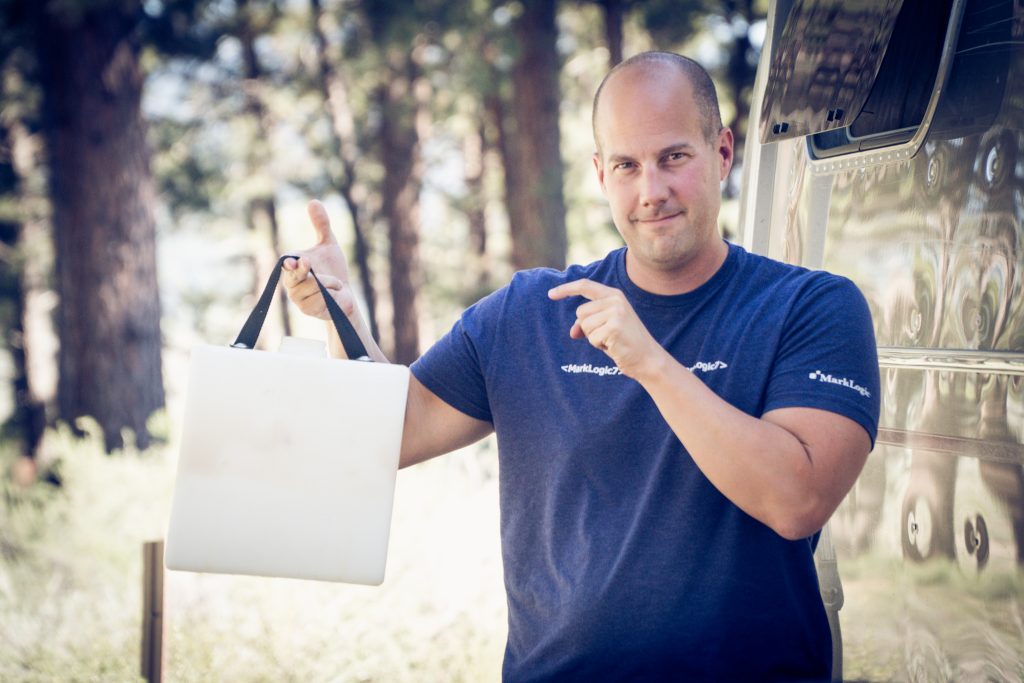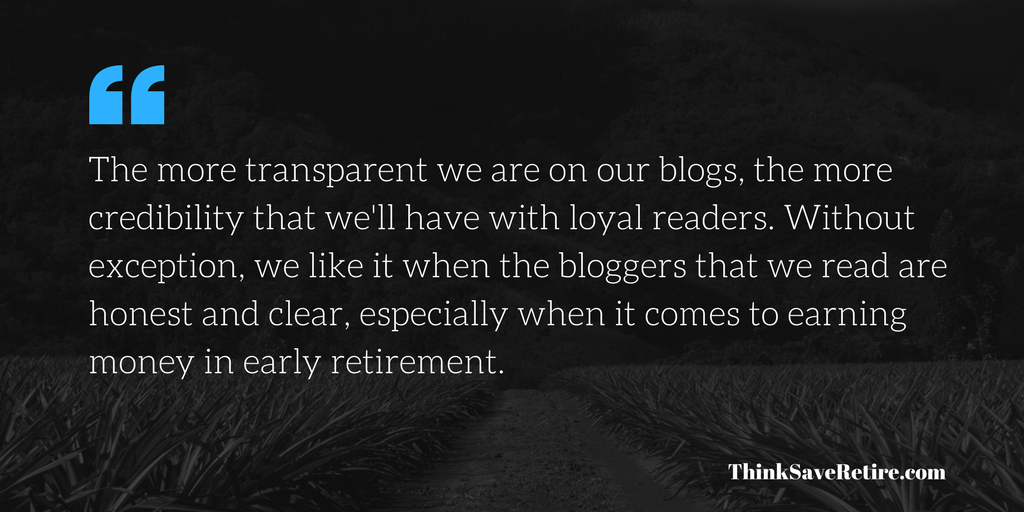The sticky mix between early retirement and the mainstream media

As a personal finance blogger who blogs about early retirement, you'll eventually find yourself in a situation like this: Your story gets picked up by national media (hooray!). People read it, hop over to your site, find out that you've monetized your blog or are making money on the side, then feel duped. There is a disconnect between blogging about early retirement and the mainstream media.
The problem is simple: people reading the national media story aren't intimate followers of the personal finance community - even if they want to retire early. To them, "retirement" means something very different. They think of sipping margaritas on the beach, not sitting in front of a computer writing articles for a fully-monetized blog - yeah, kinda like mine!
They assume that retirement means you're basically doing nothing that earns money. You might volunteer or something, but that's about it. No monetized blog. No side hustles. No additional earned income from anything.
How do we deal with this mixture of readers so we aren't pissing people off, but still offer something that's honest and real? Is it possible to please both sides?
Early retirement and the mainstream media

The more integrated we become in the personal finance blogosphere, the more we realize that the typical early retiree doesn't just stop working. Many of us keep doing things that we enjoy, even if those things generate positive cash flow. For transparency, we post about those things on our blogs, like through income statements or juicy frequently asked questions posts.
In our minds, we're just being honest.
That transparency is the problem, though. It reveals that we're actually making money in retirement, and people's traditional definition of retirement flies in the face of actively making money.
"I retired early, but I'm still earning money" doesn't play nearly as well to readers of a mainstream publication. Editors of national magazines and newspapers want honesty, of course. After all, honesty equals credibility, and that credibility is what makes or breaks publications.
But, they also want something that will grab the reader's attention.
A strong repeat readership is what makes them money. Without a solid stream of interesting or shock articles, national publications shrivel up and die. As a result, article titles need to be attention-grabbing and pointed, and the content itself must reach deep inside the reader and tug at their emotions.
When they pick up one of our stories, they routinely focus on those elements of our story they believe will grab the most attention. For most of us, it's the concept of "early retirement".
Of course, that is very often not the whole story.
Our blogs fill in those juicy gaps
We aren't just "retired early" and sitting on the beach, are we? Of course not. We're still active. In fact, I'm busier than I was before calling it quits because I'm now doing things that I actually enjoy. Every day.
I'm also earning cash flow through my side hustles and by monetizing this here blog. I'm proud of what this blog has become, and I make no apologies for earning money off of all those hours I've poured into Think Save Retire.
Frankly, it's about time I stop giving my time and effort away for free. I've done that a LOT in my past, and I'm taking strides to curtail that draining habit.
The more transparent we are on our blogs, the more credibility that we'll have with our loyal readers. Without exception, we like it when bloggers are honest and clear, especially when it comes to earning money in early retirement. We feel like we can trust them and that the effort we put in to read their blog posts is time well spent.
In a way, we're supporting their honesty through readership.
But, what about that reader who hopped over from a mainstream media article and expected pictures of us in our rocking chairs or complaining about the neighbor kids and their raucous behavior at all hours of the night?
They don't get that. Instead, they see ads or affiliate links. They see book or gift card giveaways and income statements with big numbers. We're being honest, but to them?
They might take a very different position on our honesty.
"That bastard! He's not actually retired. Look at all those ads on his blog! He works for some other website, too. AND he has a freakin' YouTube channel? This guy is all B.S."
Well damn.
What are we personal finance bloggers supposed to do? On one hand, most of us want to be transparent and honest. But on the other, that transparency very often generates tired vitriol from the general population.

How I manage the mainstream media connection
In short, I choose to focus my energy on my loyal readers, not those who would hop over from a mainstream media and start shouting about what "retirement" actually means. I choose not to enter the debate about "retirement".
I believe that retirement is about the freedom to choose exactly what we do with our time, even if that includes side hustles or earning money through blog monetization. That's my definition, period. Agree or disagree - that's perfectly fine. I'm not here to debate "retirement".
And, I completely understand how someone might feel bamboozled by my story if they expected me to conform to the traditional definition of retirement. I don't.
Don't get me wrong - I love all my readers. One of the coolest things about the mainstream media is exposure. I love it when our story gets out into the open waters of society. Even though I know hate will naturally come from stories about those who live outside the structure of conventional wisdom, the blog exposure more than makes up for it.
Am I just in it for the exposure?
Not JUST, no. We all enjoy the exposure, but it also comes at a cost. A mental and emotional cost. If you aren't good at dealing with hate, then don't seek media attention. Trust me, you probably won't like it.
I'm in this to offer something different than the traditional 9-5 to 65. Our situation won't work for everyone, and that's okay. Some may not believe that we're retired, and that's also okay.
My story isn't for them.
I've learned over time that I simply cannot be all things to all people. Sooner or later, you're going to piss someone off. Offend people. It happens. And, that's all a part of a creative atmosphere, which blogging most definitely is.
But, I've also learned that our blogs touch a LOT more people than we think. Most of our readers don't leave comments or email us. Some do, but most don't. Our stories spark a lot of internal reflection for many people that we'll never meet. Like two ships passing in the night.
In short: I don't worry about it. It's my story - that's it. If people believe that I'm full of shit, that's perfectly fine. There are a lot of blogs out there to choose from. Mine is just one of 'em.
Start caring about what every visitor thinks and you will quickly drive yourself insane.
Trust me, I've been there.
My media rap sheet
Here is what my media rap sheet looks like as of this morning. I've had stories written about us (those tend to focus on early retirement) and others have been syndicated and republished:
Rockstar Finance: My Retirement Renaissance
Business Insider: I’m 34 and I’m planning to retire next year
Forbes: How One Man Curbed His Extreme Spending And Will Retire By 35 To Travel
CNBC: This couple retired in their 30s and are now traveling full time in an Airstream
CNBC: 36-year-old retiree: This is the secret to getting rich
CNBC: This couple retired in their 30s – here’s exactly what their budget looks like
CNBC: 36-year-old retiree: Saving money doesn’t get you rich – here’s what does
CNBC: 36-year-old retiree: A big paycheck doesn’t lead to early retirement – here’s what does
CNBC: 5 early retirees share their No. 1 money-saving tip
CNBC: 35-year-old retiree: 5 simple habits will help you retire early
CNBC: This is the thing that surprised me the most about early retirement
CNBC: 17 stupid simple ways to make early retirement easier
CNBC features tend to get syndicated to partner outlets, like Don’t Waste Your Money, Yahoo Finance, and MSN.
CBS MarketWatch: 7 lessons I learned working in the corporate world before retiring at age 35
CBS MarketWatch: Here’s the secret to success: Lie to yourself
CBS MarketWatch: 13 simple ways to make early retirement easier